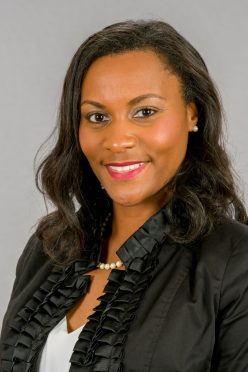<< Back
Daileann Hemmings Returns to Hartford Hospital

October 07, 2022
It’s a homecoming that has been years in the making for Daileann Hemmings, MSN, who was recently named program director of Maternal Health Equity at Hartford Hospital.

“I’m glad to be back at Hartford Hospital,” said Hemmings, who will examine the impacts of equity and ways to improve maternal health outcomes in the minority population. “There are many opportunities to move forward in providing equitable care and to be pioneers nationwide in maternal health equity.”
For nearly a decade, Hemmings worked for the Community Health Network of Connecticut (CHNCT), as an administrator for the Husky program, supervising clinical and non-clinical staff in perinatal care. That’s when health equity work really clicked for her. Teaching co-workers about social and structural determinants of health, health outcomes for urban vs. suburban populations, the chronic toxic exposure of racism, and how micro-aggressions and continual stress can wear down a person and impact their health and body’s ability to recover – she covered it all.
“We know 700 to 800 women die annually from childbirth-related issues and Black women are three to four times more likely to die than their White counterparts while giving birth,” Hemmings said. “It is not about Black women’s education attainment nor their social class; the maternal mortality occurrences are even higher among Black college graduates or those with access, such as Serena Williams.” Williams, a professional tennis phenom, had life-threatening complications after the birth of her daughter by Cesarean section in 2017. She had a history of blood clots and said doctors didn’t initially listen to her concerns when she had shortness of breath after the surgery.
Hemmings said listening will be a key part of her role, to provide respectful care and make sure women feel heard. “There are systems in place — where often people function on autopilot and aren’t aware of their blind spots. We need to unlearn behaviors that perpetuate disparities and be intentional in the way we work and communicate. It is imperative that we look at these disparities and structural determinants through the health equity lens to identify ways to strategically improve the health outcomes of women, especially Black women.”
Hartford serves as a home base
“I’m so glad I chose nursing… I have evolved, yet I have remained in women’s health my whole career. I have been able to do and accomplish things I would never have thought of when I started as a CNA, from teaching at the University of Hartford, to working in my community, to my current role,” she said. “There are so many opportunities for nurses to grow in the healthcare field.”
Hemmings’ early career took her across the country as a traveling nurse, then she returned to Hartford to earn her master’s degree in nursing, with a focus on Community and Public Health, from the University of Hartford. During her graduate studies, she traveled abroad to Australia, learning about aboriginal health and the similarities in the marginalized and underserved populations in the United States. She is currently pursuing her doctorate at Yale.
Whether working abroad or in Hartford neighborhoods, she said, “it is vital to gain knowledge from people working and living in the space about what they need. Their participation is key, as they know what has been tried and failed in the past; it is important to let the community lead. We need to gain community residents’ trust, connect in a meaningful way and learn from, as well as with, them.”